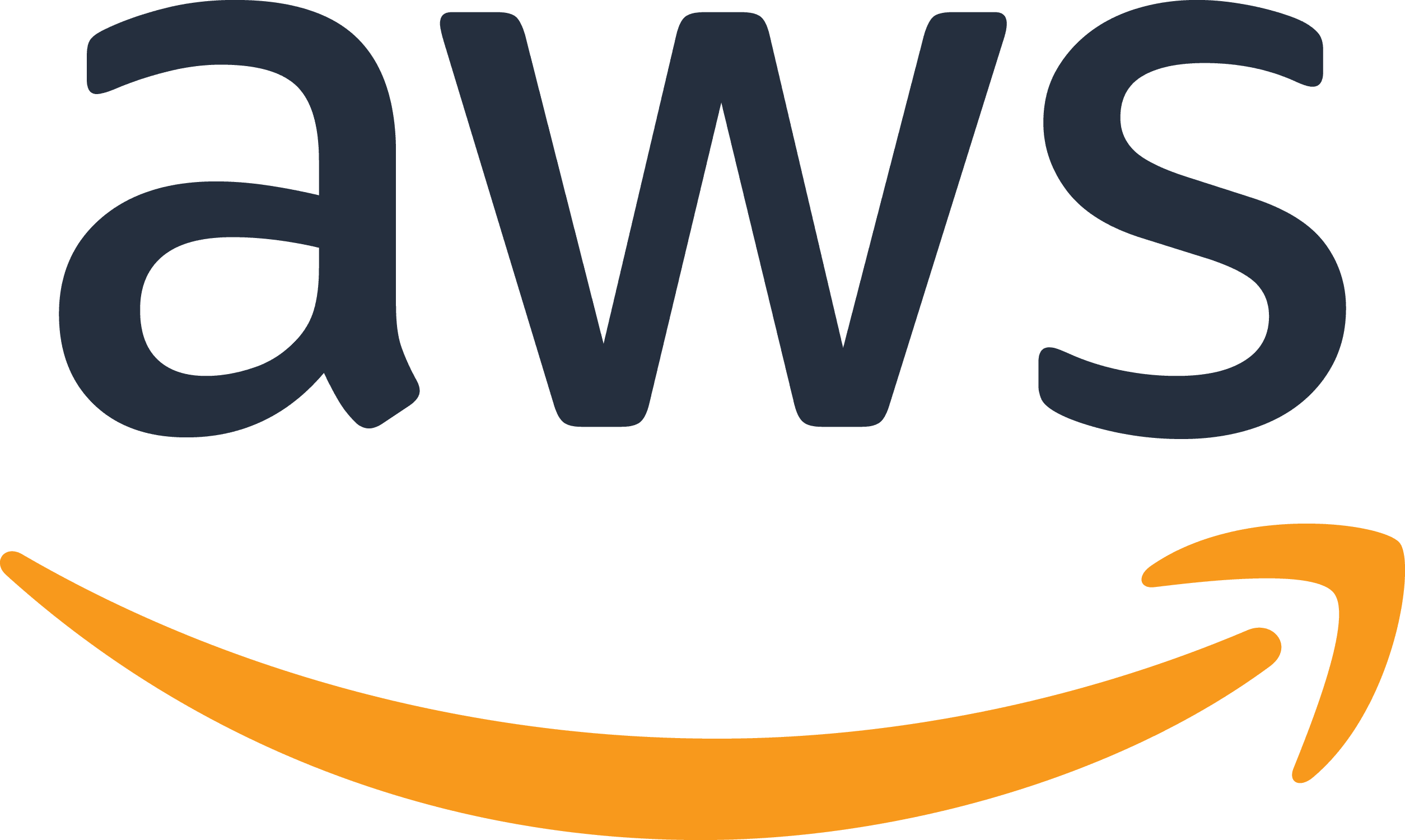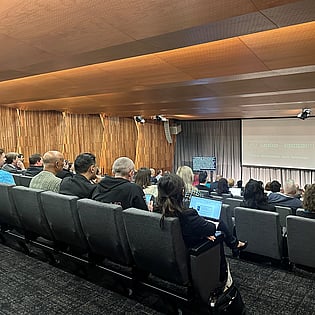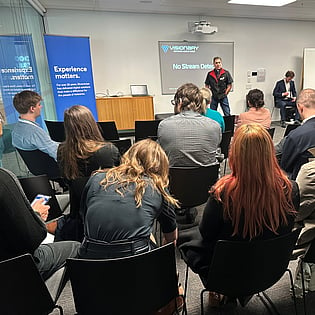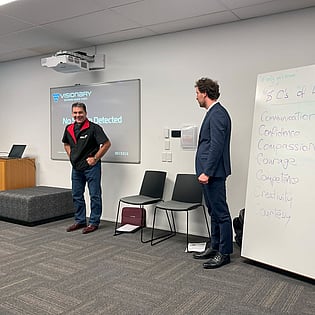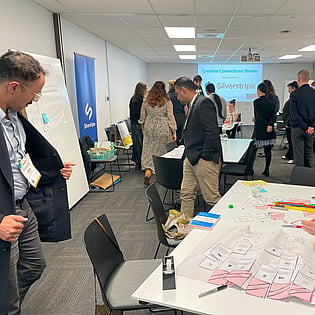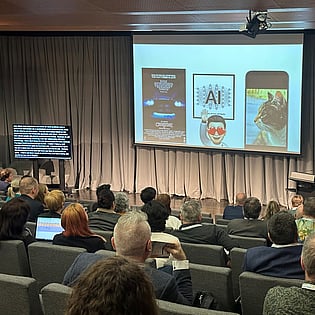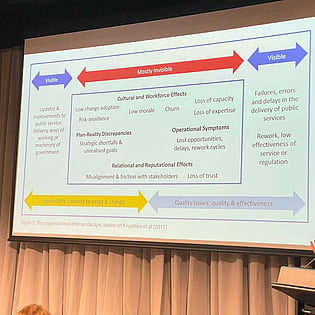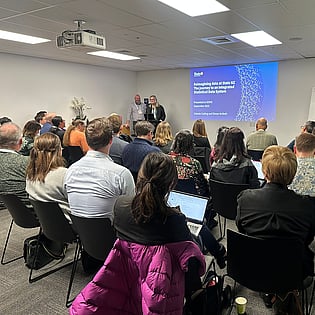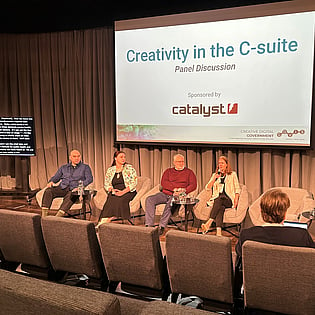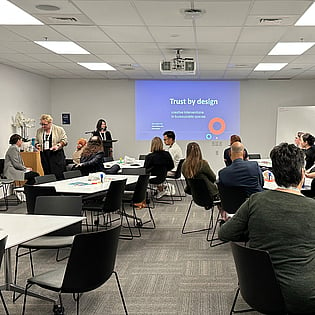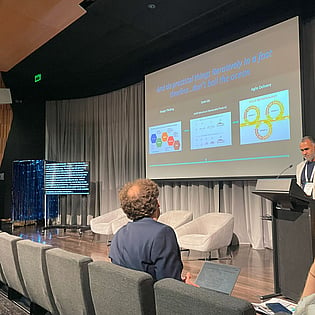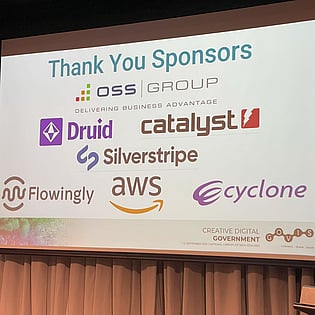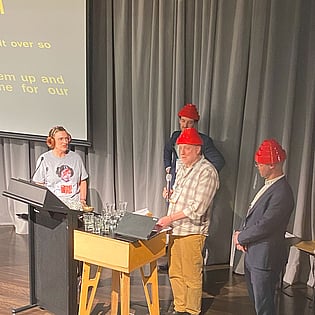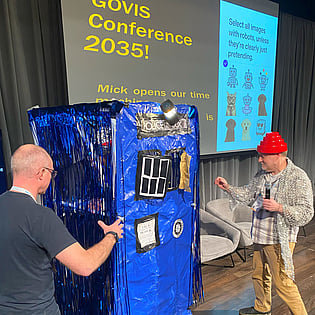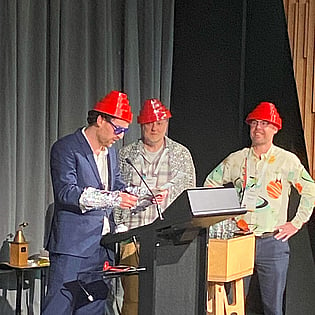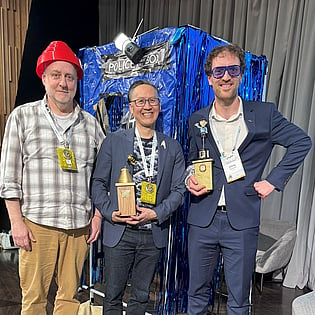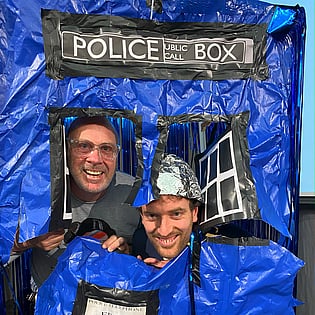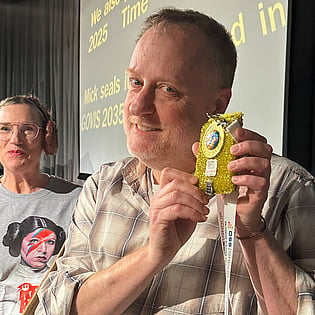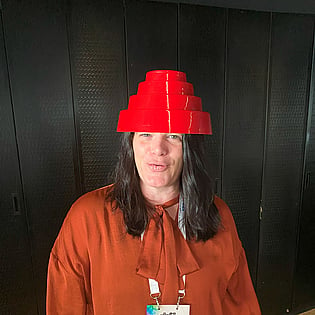
GOVIS 2025 - Creative Digital Government
Mon-Tues 1-2 September 2025, National Library of New Zealand Te Puna Mātauranga o Aotearoa, Wellington & online.
Conference resources
GOVIS 2025 Creative Digital Government consisted of a series of plenary speaker presentations, and 'creative connections' breakout streams.
Here are the resources available following the conference:
A selection of recorded plenary speaker presentations here on our YouTube channel
A selection of the presentation slides here in Google Drive
The live transcript of all plenary speaker presentations (from Katherine O’Brien of Mercury Transcripts Limited) provided as-is here in Google Drive
See below for the conference programme and précis, and some photos:
Writeup
The theme for GOVIS 2025 was Creative Digital Government. But why is it important for public servants to care about creativity?
There is a global narrative out there that the public service provides little in the way of value but is instead an expensive deadweight and encumbrance on progress. Perhaps the most colourful example of this is one recently appointed senior public official in a major democracy previously stating their wish (that certain elements are now trying to bring about) that public servants be “traumatically affected” and “not want to go to work”.
GOVIS readily accepts that the New Zealand public service contains plenty of examples of waste and intransigence (in fact, we spend an uncomfortable amount of time dissecting them). But we agree with Public Service Commissioner Sir Brian Roche when he says that “people work hard and they are doing their best”, even while “a lot of things happen despite the system, not because people are enabled by it”. We are encouraged when he says "I want public servants to feel really good about themselves and feel valued. And I want the public sector to be a place where people want to work because they can make a difference."
As public servants, we tend to focus a lot on knowing stuff. We spend time growing institutional knowledge, navigating technical details, and becoming respectable experts. We also tend to be deeply invested in the work that we do and care a lot about the outcomes we are aiming for. But perhaps we also need to go one further and inject some passion and creativity into the mix, if we are to shake off the above ‘deadweight’ narrative and demonstrate to the likes of Sir Brian and government ministers that the public service can indeed make a valuable difference. At the very least we need a chance to remind ourselves of this truth, and to encourage and inspire each other.*
A long time ago, Aristotle described four methods of persuasion: logos - argument from reason, evidence and logic; ethos - the speaker’s authority or credibility; pathos - appealing to the values and emotions of the audience; and kairos - the wider context, timing, or opportunity. At this conference we learnt about the latest in digital government (logos) from the information, data and technology professionals who are doing the work (ethos). But that’s not all, because the full creativity and passion of the public service and its supporters was on display (pathos) – at a time when we are rapidly responding and adapting to the ever-challenging context that we find ourselves in (kairos).
Here are some highlights from Day One:
A comprehensive overview of the NZ's vision and goals for digital government, by Paul James the Government Chief Digital Officer (GCDO). If he had a magic wand and a bucket of money, he would seek to change data flows in the public service by bringing in more automation and standardising collection. Maybe he will get his wish - as the GCDO will soon be exercising a greater mandate over digital investment and procurement in the public service!
An enthralling and discursive exploration of AI from Richard Foy where we heard about his youthful dalliance with ELIZA, and received a timely reminder about the limits to Large Language Models. Richard received the People's Choice for Best Conference Presentation, and was presented with a GOVIS Buzzie Award and medallion!
A powerful reminder from Murray Edridge the City Missioner at The Wellington City Mission, about why values and a moral compass matter when working the public service. Murray struck a chord (or a nerve!) by cutting to the heart of many issues that public servants grapple with around leadership and courage. People said it was "beautifully spoken about values in action" and "good to hear someone being so open and honest". Tears were shed.
A tour de force of public service restructures in NZ (complete with some recommended changes...) by PhD candidate Annika Naschitzki, who took time out from thesis-writing to come and talk to us about her research. With some conference delegates recently having been through a restructure (and with some receiving news about the disestablishment of their roles in the week before the conference), emotions were running high and the room was laser-focussed. Annika did a great job of unpacking and contextualising a PhD-load of research in a positive and constructive way that was validating and accessible through the lens of technical debt, but didn’t stray into cynicism or fatalism. Annika received the Judge's Choice for Best Conference Presentation, and was presented with a GOVIS Buzzie Award and medallion! Her research has been profiled in the Post, and you can also read about it here on her Substack called Bowl of Fishooks.
An eye opening overview of neurodivergence in IT by Rachael Hurren, Director Learning and Development at Inde Technology. Rachael covered a wide range of information (especially to do with ADHD and autism - what it feels like and looks like, and their neurological basis), but her challenge was clear and simple - we should all 1) consider what changes we can make in our workplaces so that everyone can do their best work, and 2) make an effort to learn how to work with those people who frustrate or confuse us!
Here are some highlights from Day Two:
A remix of lessons for digital government from the web/dotcom era in the 1990s and 2000s, from Andy Neale, Deputy Chief Executive for Access and Digital Services, Parliamentary Counsel Office. One of these lessons was to do with procurement - where all prototypes/products delivered by the supplier are made open source. This gives suppliers an additional incentive, as they will be able to reuse the products they develop for you with their other clients. This option seems to be particularly attractive for startups, that might be less interested in profit margins and more interested in having an opportunity to create a groundbreaking new product with a reputable client. A great win-win was for the public and private sector to collaborate and innovate.
The view from the C-Suite on creativity - where we heard from a panel consisting of Stuart Wakefield (Ministry of Education), Jan Sheppard (PHF Science), Alix Clark (New Zealand Red Cross) and Sonny Taite (Health New Zealand | Te Whatu Ora) and hosted by Brian Norris (Catalyst). We heard a series of inspiring examples of creativity (e.g. setting up Zero Data and finding a new purpose for it post-lockdown, building ALMA, dreaming up Benny the IT support mascot, and founding the Tupu Toa programme); as well as their tips on winning over risk-averse colleagues (stand out and lead, take shared ownership of risk, ensure IT is business-led, and communicate relentlessly).
A window into the purpose-driven mindset of Prashant Bakshi, Deputy Chief Executive Strategic and Corporate Services at NZQA, who is always looking to understand the big picture, nudges others to connect the dots across government, has gradually and carefully strengthened an institutional collaboration "muscle" at NZQA, and is constantly inspired by the potential of our young people to achieve great things through education.
The finale - in which the GOVIS committee and MindMeld Coaching traverse the past, crowdsource training data from conference delegates, build GOVIS AI, and unleash it on the future to save the public service in 2035! Along the way impressions are reflected upon, fond memories reimagined, sundry people thanked, science fiction franchises conflated, a time capsule sealed, trophies and medallions bestowed, and unqualified thought leadership espoused. No AIs were harmed in the making of this conference finale.
*Here we acknowledge the inspiration of the Creative Bureaucracy Festival, which has now also launched in Australia and New Zealand.
Featured speakers
Here is more information about some the speakers at GOVIS 2025 - Creative Digital Government, in order of being confirmed for the conference:
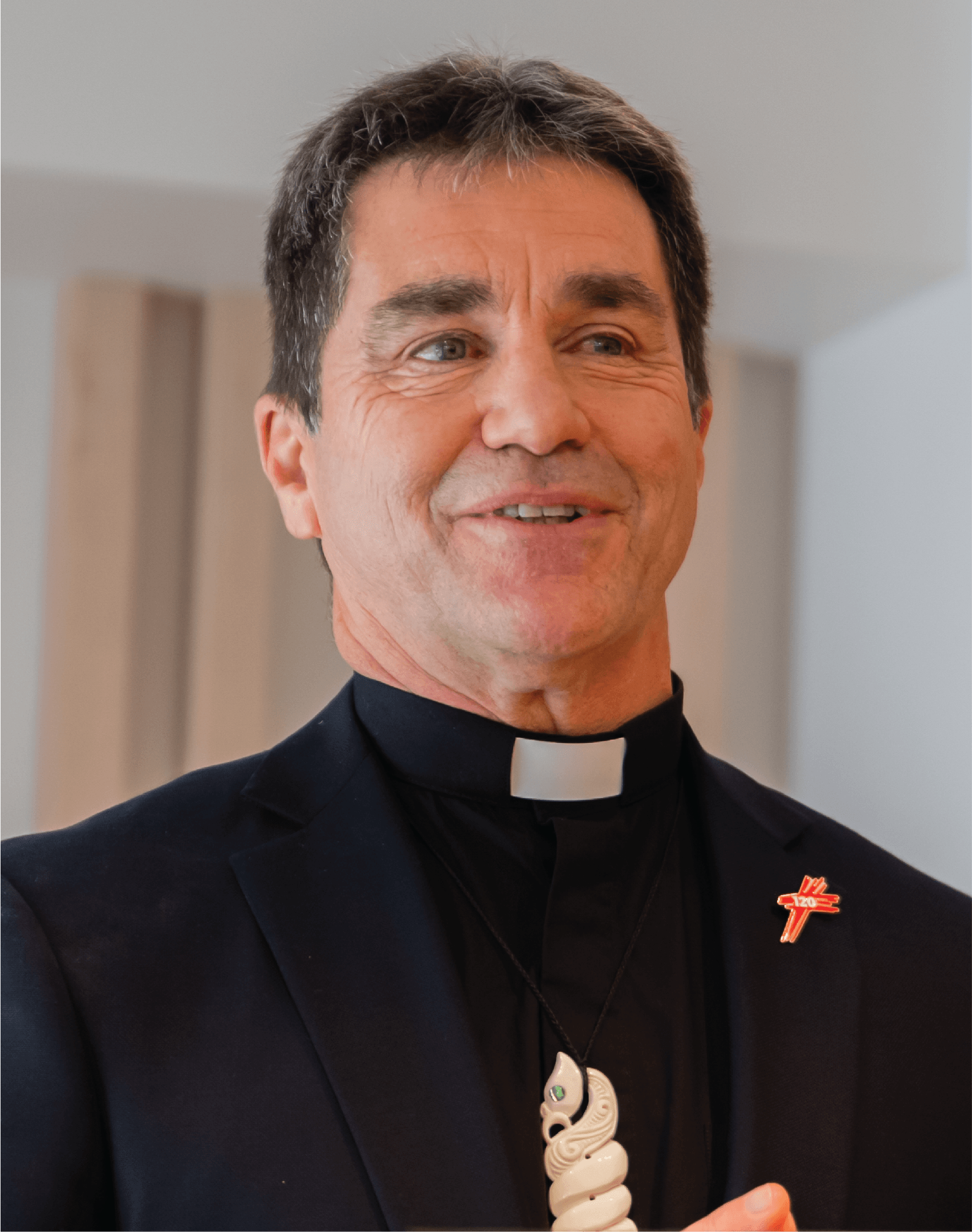
Murray Edridge - City Missioner at The Wellington City Mission
Reflections on breaking the mould [Keynote]
Reverend Murray Edridge has been the Wellington City Missioner since 2018. He has a commercial background as a Chartered Accountant, initially working in energy distribution and retail, media, and education.
Murray has worked with children and families throughout New Zealand for over 20 years; including 8 years as the Chief Executive of Barnardos New Zealand, 5 years as a Deputy Chief Executive in the Ministry of Social Development and being the inaugural Chief Executive of Genesis Youth Trust. Murray has had governance and leadership roles in a range of business, community, church, and sporting organisations for many years.
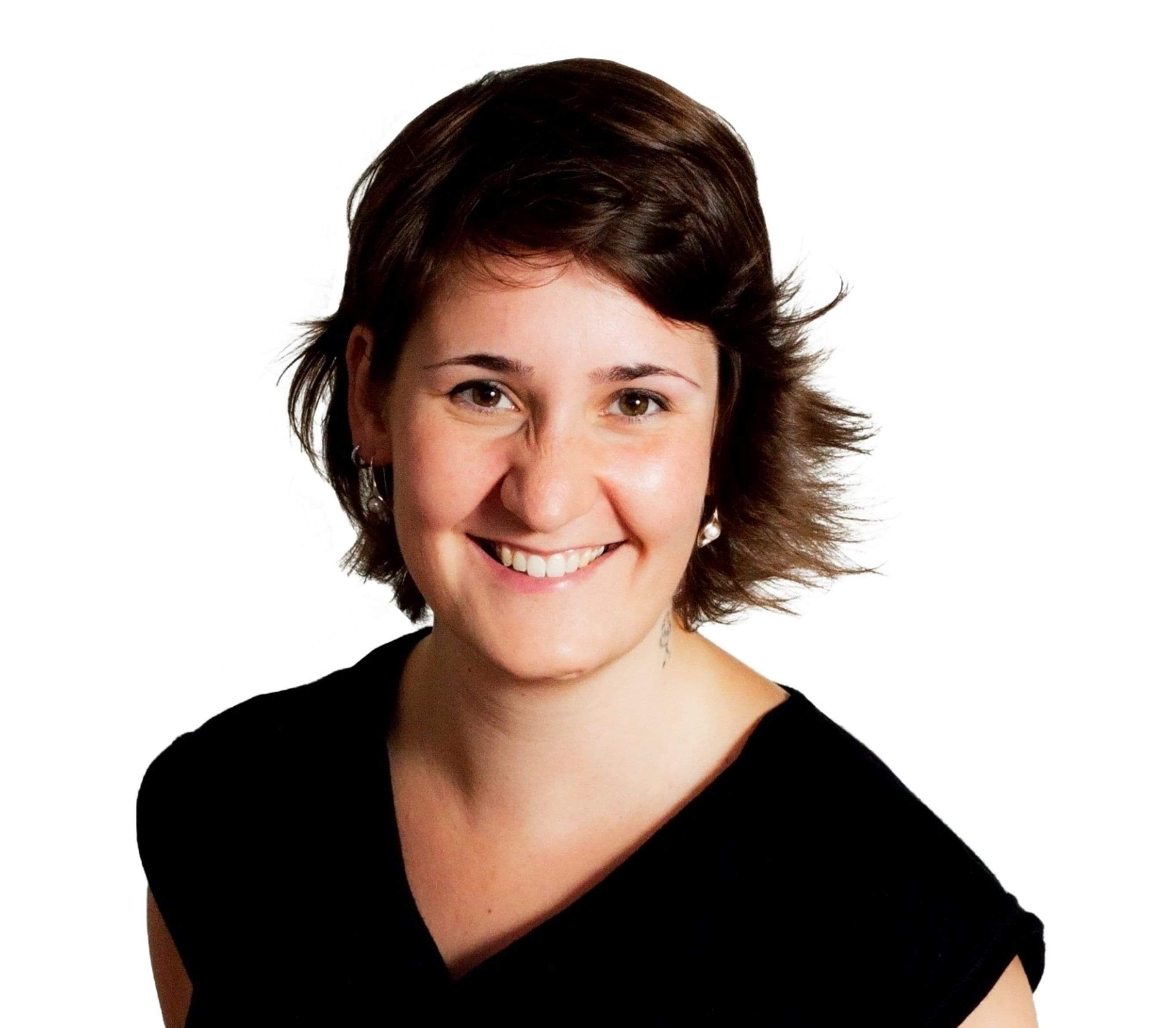
Annika Naschitzki - PhD Student, School of Government, Victoria University of Wellington
What do public service restructures and technical debt have in common? [Keynote]
Annika Naschitzki is a doctoral student and Research Fellow at Te Herenga Waka—Victoria University of Wellington, and a specialist in Customer Experience and Service Design. With over 15 years’ experience in user research, accessibility, and co-design, she has led service design initiatives across Aotearoa’s public sector. Her work includes contributions to SmartStart and Govt.nz, and involvement in the "Better Public Services – Result 10" programme, which sought to improve digital interactions between people and government. Her current research investigates the drivers and impacts of internal restructures in New Zealand’s public sector, focusing on how managerial culture, project management approaches, and staff participation shape change processes and their outcomes. Annika brings a design-led and people-centred lens to public management and reform. She shares her reflections on restructuring, public sector reform, and design in government each week in her Substack newsletter, Bowl of Fishhooks.
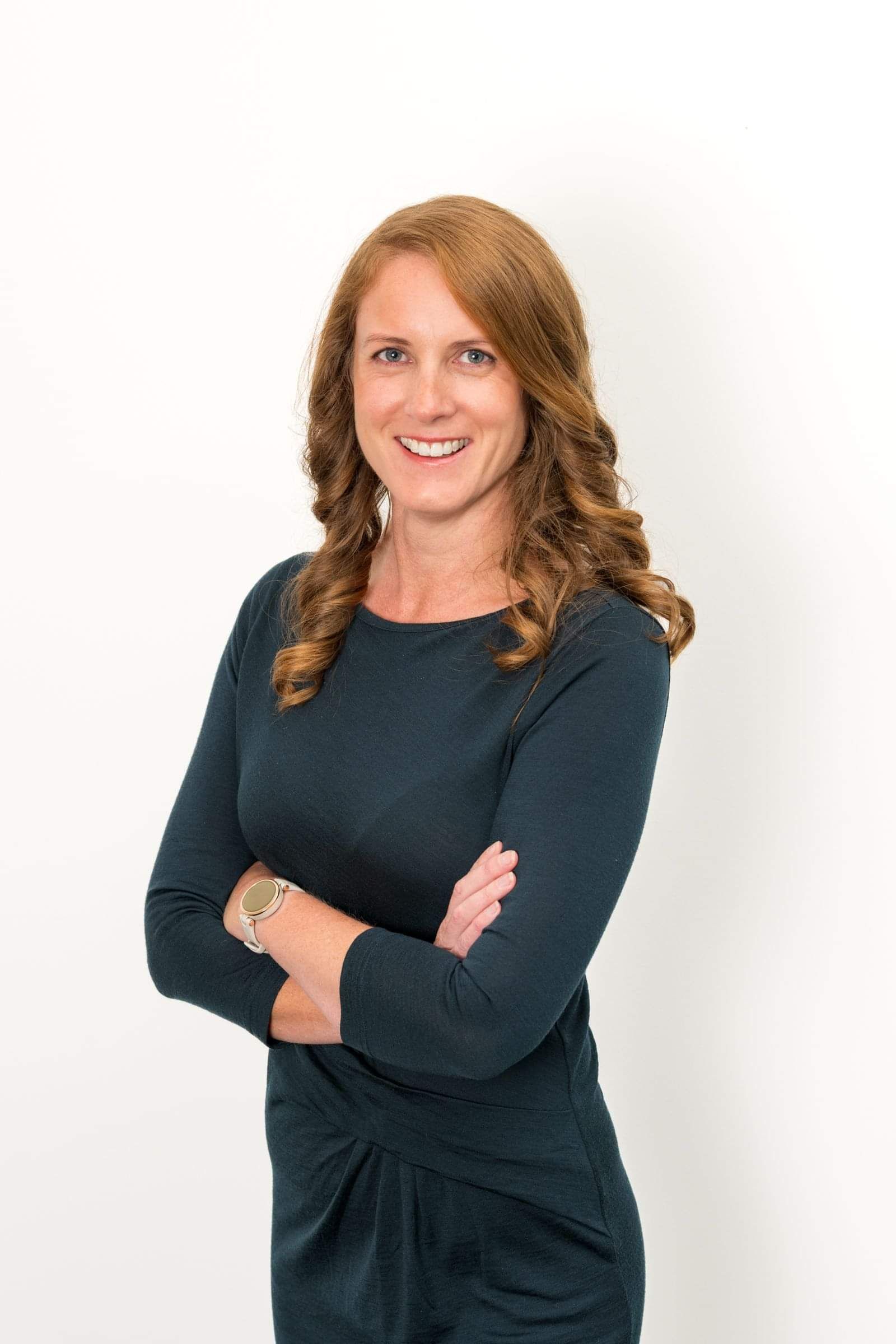
Rachael Hurren - Director Learning and Development, Inde Technology
Neurodivergence in IT: beyond the stereotypes [Keynote]
Rachael Hurren is the Director of Learning and Development at Inde Technology, an employee-owned, cloud-based enterprise IT consultancy renowned for its technically led, outcome-focused approach. For the last twenty years she has worked with organisations to build cultures and development programmes that empower people to play to their strengths and excel in their careers.
Holding postgraduate qualifications in psychology and education, Rachael is passionate about helping individuals understand how their brains work, what makes them unique, and how to leverage their strengths to thrive. Over the past five years, she has applied this approach to helping individuals and organisations develop a deeper, more accurate understanding of neurodivergence.
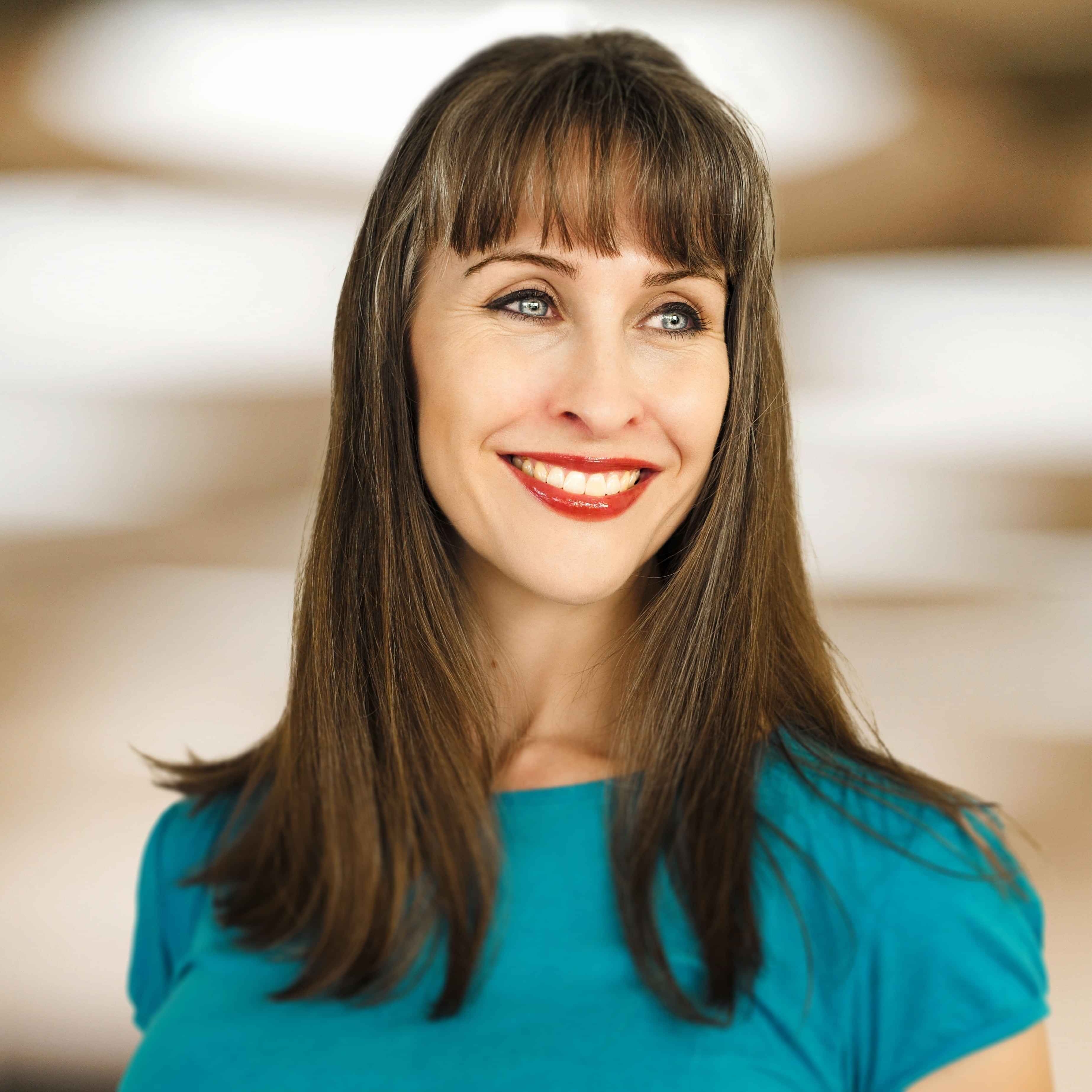
Shivonne Londt - Senior Solution Architect, New Zealand Public Sector, AWS
At the cutting edge - where are AI tools heading next? [Keynote]
With over 20 years of experience at the intersection of technology, strategy, and transformation, Shivonne Londt helps public sector organizations harness the power of cloud and AI to deliver impact at scale. As a Senior Solution Architect at Amazon Web Services, Shivonne leads initiatives across Weather and Research, designing resilient, intelligent solutions that empower innovation.
Currently pursuing a PhD in AI, her research focuses on evolutionary algorithms and neural architecture search — exploring how large language models can supercharge genetic optimization. Shivonne is passionate about bridging cutting-edge research and real-world outcomes, especially in complex, high-stakes environments.
Previously Head of Engineering at ANZ NZ, Shivonne spearheaded omni-channel integration and process automation, transforming agile delivery across large-scale teams. Shivonne’s background spans technical leadership, cloud modernization, and platform engineering, with hands-on expertise in AWS, Salesforce, and scalable digital ecosystems.

CONFERENCE OPENING ADDRESS:
Paul James - Secretary and Government Chief Digital Officer, Department of Internal Affairs, Te Tari Taiwhenua, New Zealand
After several senior roles in the New Zealand public service, Paul has extensive experience in strategic policy development, leading change, and working collaboratively and effectively across government and communities. In 2018, he was appointed Secretary for Internal Affairs, Secretary for Local Government and Chief Executive for Te Tari Taiwhenua Department of Internal Affairs. Paul also holds the role of Government Chief Digital Officer (GCDO) with responsibility for digital leadership across government agencies.
The GCDO leads work to uplift the public service’s digital skills, and as the lead for the public service’s use of AI, he has issued guidance to support agencies to make more informed decisions about its benefits and risks. The GCDO supports agencies and Ministers to align with an All-of-Government investment direction and manages a portfolio of digital products and commercial services that is currently used by more than 330 public sector agencies and organisations. The GCDO is currently leading work to establish an innovative and secure digital identity ecosystem and supporting an increase in the use of data and modern digital platforms to make real-time, evidence-based decisions.
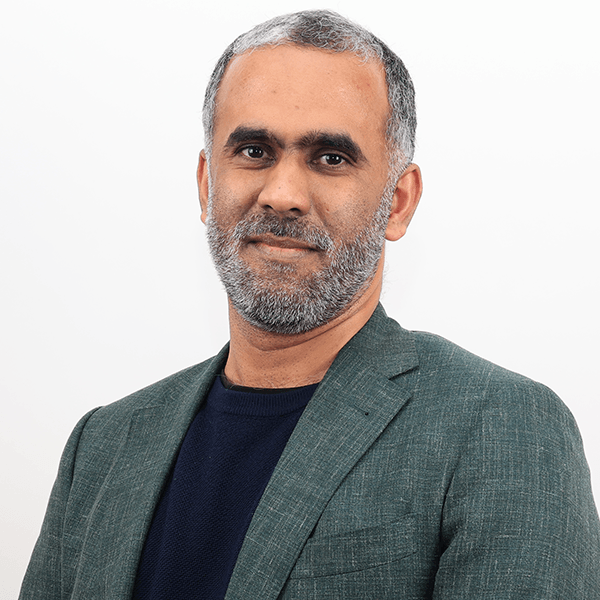
Prashant Bakshi - Deputy Chief Executive, NZQA
Practical ways of providing joined-up services [Closing Keynote]
Prashant joined NZQA in February 2018 as Chief Customer Officer and took the role of Deputy Chief Executive, Strategic and Corporate Services in December 2024. He has worked across the public and private sectors in New Zealand, Singapore and India.
Prashant has experience leading teams across customer channels, Customer Experience (CX), data science and AI, information technology, and corporate functions including regulatory reviews and digital transformation.
Prior to NZQA, Prashant worked in various roles at the Ministry for Primary Industries.
Prashant has an MBA from Victoria University, a Postgraduate Diploma in Business Administration from the Singapore Institute of Management, and a Bachelor of Science in Biotechnology and Zoology from University of Mumbai.

Richard Foy - Kaiwhakahaere, Pūnaha Mōhio, Te Puni Kōkiri
From Te Tiriti to ChatGPT [Keynote]
In this personal talk, Richard shares his thoughtful journey of exploration and discovery of AI. Through deep dives into its synthetic nature, various modalities, and seemingly magical properties, he shares his musing on the nature of consciousness and intelligence, trust, and the relationship we’re striking up with AI. This exploration culminates in a call for public servants to define our relationship with this technology, that demands our human judgment and ethical leadership.
Richard is an Aotearoa New Zealand-born son of Chinese immigrants, accomplished public speaker, failed comic-novelist and a public servant who’s enthusiastically committed to a career of public service and leadership. Richard is a former Chief Archivist of Archives NZ, our National Archives, an LDC (Leadership Development Centre) 2019 Fellow, 2018 Geoffrey Bolton lecturer (State Records Office, WA), President of ARANZ (Archives & Records Association of NZ) and a wannabe Starfleet Officer. Richard is currently Kaiārahi, Pūnaha Mōhiotanga (Knowledge Systems) at Te Puni Kōkiri.
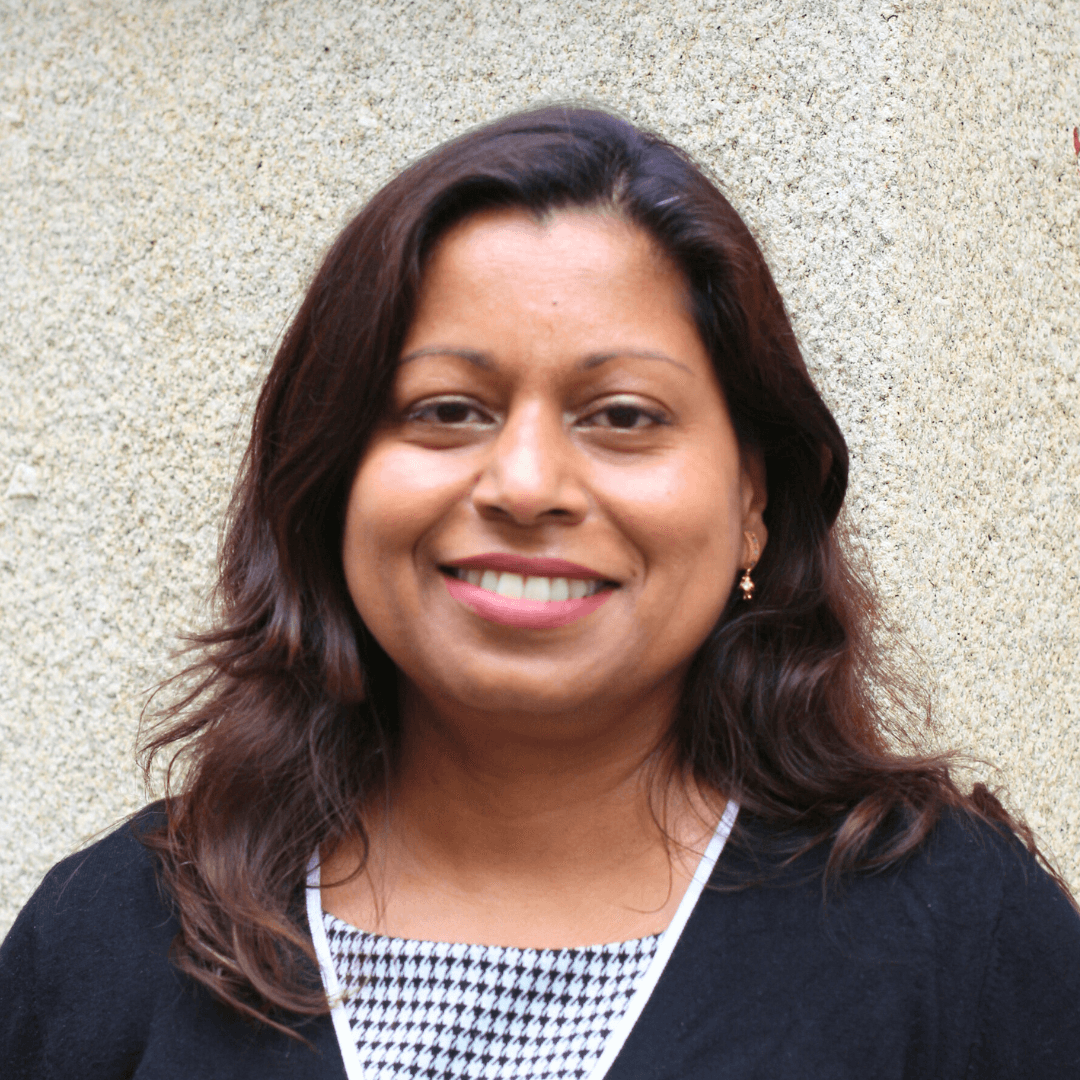
Tahia Eaqub - Interim Director – Data and Economics, Social Investment Agency, Toi Hau Tāngata
Social investment: The importance of data and evidence [Keynote]
Social investment approach is a fundamental shift in the way social services are commissioned and delivered in New Zealand. Data and evidence infrastructure underpins this transformation by making it possible to robustly identify better investment choices, by enabling feedback loops for providers that identify which interventions are working for which people.
Tahia leads the Analytics, Data Systems and Economics teams at Social Investment Agency, which she joined in 2021. Tahia is passionate about connecting data with communities and decision makers. She has over 20 years of experience in data analytics and economic research and is experienced in leading teams to deliver high quality analysis in the social sector. She has previously worked at ACC, Reserve Bank of New Zealand, NZIER and Stats NZ. Tahia has a Master of Economics from Lincoln University.
GOVIS wishes to acknowledge and thank our conference sponsors for their support


